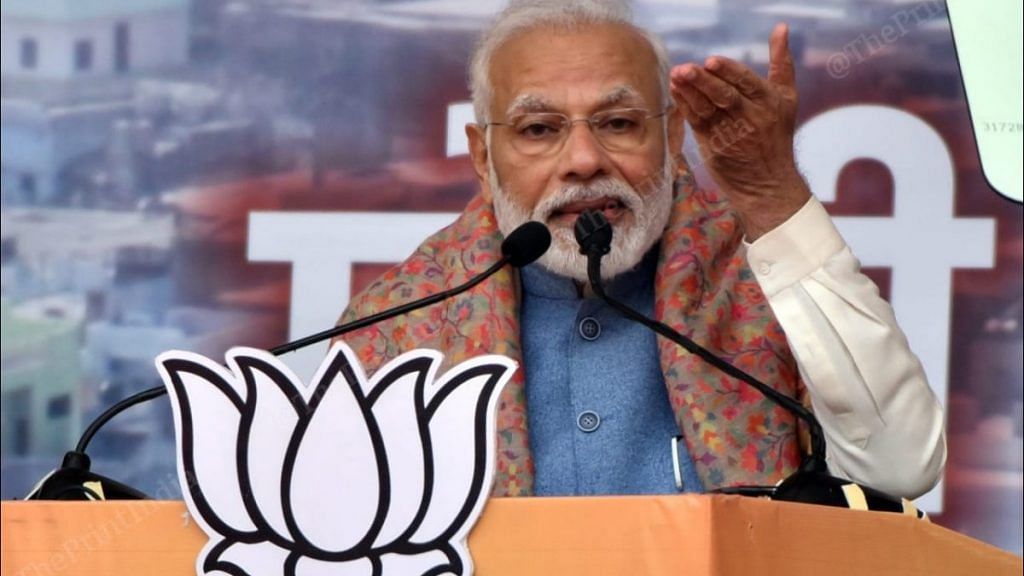It is widely known that the Bharatiya Janata Party and its ideological parent Rashtriya Swayamsevak Sangh don’t share the same views as Mahatma Gandhi on India’s Partition. So, it came as a surprise when Prime Minister Narendra Modi recently cited one of Mahatma Gandhi’s Partition-related quotes to defend his government’s amendment to the Citizenship Act.
Always eager to appropriate Gandhi, PM Modi taunted the Congress Sunday during his rally at Ramlila Maidan in Delhi, “Gandhiji had said that Sikhs and Hindus living in Pakistan will always be welcomed in India. This Act is in line with the promise the Government of India made in 1947…You believe me or not but at least believe Gandhiji.”
It hardly matters to the BJP’s propaganda machinery that it’s been 72 years since Gandhi made the remark and 48 years have passed since the collapse of ‘the two-nation theory’ with the formation of Bangladesh from erstwhile East Pakistan.
A booklet in circulation highlights Gandhi’s quote in a more asserting form, with a reference date and a photo of Gandhi to support the claim. The quote says, “Mahatma Gandhi announced openly in a prayer meeting that Hindus and Sikhs staying in Pakistan can come to India by all means if they do not wish to stay there. In that case, it is primary duty of Indian Government to provide them employment and make their lives normal.” [Naagrikata (Sanshodhan) Adhiniyam-2019, Ek Parichay Kamal Sandesh, Dr. Mukerji Smriti Nyas, New Delhi, December 2019, page 9]
Also read: This is why Modi will win the war protesters have waged against him on CAA
Gandhi on Pakistani refugees
Before we go ahead, it is imperative to note what Gandhi actually said about the treatment of minorities after Partition. He mentioned Hindus and Sikhs a couple of times in his post-prayer speech on 26 September 1947. He talked about Pandit Thakur Datt who had to flee Lahore, and said that “he (Gandhi) wanted him and all the other Hindu and Sikh friends to help him in restoring real peace in Delhi. Then he would proceed to Western Pakistan with fresh strength.” (Delhi Diary, M.K.Gandhi, 26-9-1947, Page 38, Navjivan Publication, Ahmedabad, 1948)
On the role of the Indian government, Gandhi said, “To secure justice for the Hindus and Sikhs was the function of the Government.” (Delhi Diary, M. K. Gandhi, 26-9-1947, Page 39) This quote has been deliberately dug up and spiced up to buttress Modi government’s arguments in the CAA debate. It is a travesty of truth to quote Gandhi falsely and that too in support of a law that discriminates against refugees from neighbouring countries on the basis of religion.
If one is really interested in knowing what Gandhi said during testing times, then his post-prayer speeches from September 1947 to January 1948 serve as a better guide. Just a day before the speech mentioned above, Gandhi dealt with the subject of ill-treatment of minorities with more force. In reply to a question, he said he did not propose that the Indian government should ignore the mistreatment of Hindus and Sikhs in Pakistan. The government was bound to do its utmost to save them. But his answer most certainly did not tell Indian authorities to drive away Muslims and copy Pakistan’s methods. (Delhi Diary, M. K. Gandhi, 25-9-1947, Page 35).
As a staunch optimist, Gandhi hoped that wiser counsel would prevail and Muslims, many of whom had possibly not migrated to Pakistan out of their own free will, should be asked to return to their homes in India with a sense of safety. (Delhi Diary, M. K. Gandhi, 17-9-1947, Page 18). He would express such a hope almost as an inevitable condition for peace in the future.
Also read: When Nehru sat down for a tell-all on Sardar Patel, Maulana Azad & Netaji’s Hitler leaning
Debunking popular perception
In reply to another question, Gandhi said that “his Hinduism taught him to respect all religions. In that lay the secret of Rama Raj.” Gandhi added: “If Pandit Jawaharlal, the Sardar and people with their ideas had forfeited their respect and confidence, they (people) could replace them by another team that had their confidence. But they could not and should not expect them to act against their conscience and regard that India belonged only to the Hindus. That way lay destruction.” (Delhi Diary, M. K. Gandhi,7-10-1947, Page 69).
Unlike the popular perception that Gandhi appeased Muslims and Pakistan, he spoke frequently against Pakistan’s ill-treatment of its minorities. He said, “Pakistan has to bear the burden of its sins, which I know are terrible enough. It should be enough for everybody to know my opinion (in so far as it has any value) that the beginning was made by Muslim League long before 15th of August…we of the union copied the sins and thus became fellow sinners. Odds became even. Shall we now awake from the trance, repent and change or must we fall?” (Delhi Diary, M. K. Gandhi, 24-11-1947, Page 202).
It would be interesting to note what ‘unfinished agenda of Partition’ — a rhetoric common on both sides of the border — meant for Gandhi. He could never bring himself to accept the proposition of a permanent exchange of population. Even if the refugees were well settled, they would return to their old homes. Therefore, Gandhi could not envisage real peace without the parties returning to their homes. (Delhi Diary, M.K. Gandhi, 31-12-1947, Page 296). He expressed this sentiment repeatedly during the last phase of his life in personal conversations as well as in public speeches.
Also read: BJP’s failure to see dissenting students as citizens belies Modi’s own youth activist history
The Modi government would do well to revisit the history before it thinks of incorrectly using Gandhi’s words to justify its divisive policies.
The author is a senior columnist and writer based in Ahmedabad. Views are personal.
